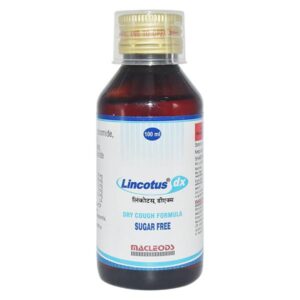DEXTROMETHORPHAN + PHENYLEPHRINE + PHENYLPROPANALAMINE
Dextromethorphan: Dextromethorphan is a medication commonly used as a cough suppressant. It belongs to the class of drugs called antitussives. Dextromethorphan works by blocking the cough reflex in the brain, reducing the urge to cough.
The drug is typically used to relieve cough symptoms associated with the common cold, bronchitis, and other respiratory illnesses. It is also found in over-the-counter cold and cough medications, often in combination with other active ingredients such as decongestants or expectorants.
The recommended dose of dextromethorphan varies depending on the specific formulation and strength of the product. However, typical doses for adults range from 10 to 30 milligrams taken every four to six hours. It is important to carefully read and follow the instructions on the packaging or as directed by a healthcare professional.
Common side effects of dextromethorphan may include drowsiness, dizziness, upset stomach, and nausea. Some individuals may also experience allergic reactions, such as rash or difficulty breathing. It is worth noting that dextromethorphan can interact with certain medications, such as monoamine oxidase inhibitors (MAOIs), and should be avoided in these cases.
Additionally, when used in excessive doses or recreationally, dextromethorphan can have more severe side effects. These may include hallucinations, confusion, disorientation, rapid heartbeat, high blood pressure, and even potential serotonin syndrome (especially when combined with certain antidepressant medications).
It is crucial to use dextromethorphan as directed and not exceed the recommended dose to minimize the risk of adverse effects. If symptoms persist or worsen, it is advisable to consult a healthcare professional for further evaluation and alternative treatment options.
Phenylephrine: Phenylephrine is a medication commonly used as a decongestant to relieve nasal congestion caused by allergies, colds, or sinusitis. It is also used to treat low blood pressure and to dilate the pupils during eye exams.
The mechanism of action of phenylephrine involves stimulating alpha-adrenergic receptors in the blood vessels, which causes vasoconstriction (narrowing of the blood vessels). This narrowing reduces the swelling and congestion in the nasal passages, allowing for easier breathing. It also increases blood pressure by constricting the blood vessels in the body.
Phenylephrine is available in various dosage forms, including nasal sprays, oral capsules and tablets, eye drops, and injectable solutions. The recommended dose and frequency of use depend on the specific formulation and the condition being treated. It is important to follow the dosing instructions provided by the healthcare professional or indicated on the packaging.
The side effects of phenylephrine can vary depending on the route of administration. Common side effects may include a temporary burning or stinging sensation in the nose or eyes, dizziness, headache, nervousness, increased heart rate, increased blood pressure, and difficulty sleeping. Using phenylephrine for a prolonged period or in high doses can potentially result in more severe side effects, including irregular heartbeat, chest pain, difficulty breathing, and anxiety.
It is essential to consult a healthcare professional before using phenylephrine, especially if you have underlying medical conditions such as heart disease, high blood pressure, diabetes, or thyroid problems. Additionally, phenylephrine may interact with other medications, so it is important to inform your healthcare provider about any other drugs or supplements you are taking.
Phenylpropanalamine: Phenylpropanalamine is a drug that was previously used as a nasal decongestant and appetite suppressant. However, it has been withdrawn from the market in many countries due to safety concerns.
Mechanism of Action:
Phenylpropanalamine works by constricting blood vessels, thereby reducing congestion in the nasal passages and relieving symptoms of a blocked or runny nose. As an appetite suppressant, it affects the appetite control center in the brain, leading to reduced hunger and food intake.
Use:
As mentioned earlier, phenylpropanalamine was primarily used for nasal decongestion and appetite suppression. However, due to its association with an increased risk of hemorrhagic stroke, it has been withdrawn from the market in several countries. It should not be used without the guidance of a healthcare professional.
Dose:
The dosage of phenylpropanalamine varied depending on the specific formulation and indication. However, since it is no longer widely available, specific dosing information is not relevant.
Side Effects:
The use of phenylpropanalamine has been associated with various side effects. Common side effects can include increased blood pressure, rapid heartbeat, anxiety, restlessness, tremors, insomnia, and irritability. In rare cases, it can also lead to more serious side effects such as stroke, cardiovascular events, and allergic reactions.
Because of its potential serious side effects, it is important to consult a healthcare professional before considering the use of phenylpropanalamine. It is also worth mentioning that this drug is no longer recommended for use due to its safety concerns and withdrawal from the market in many countries.

